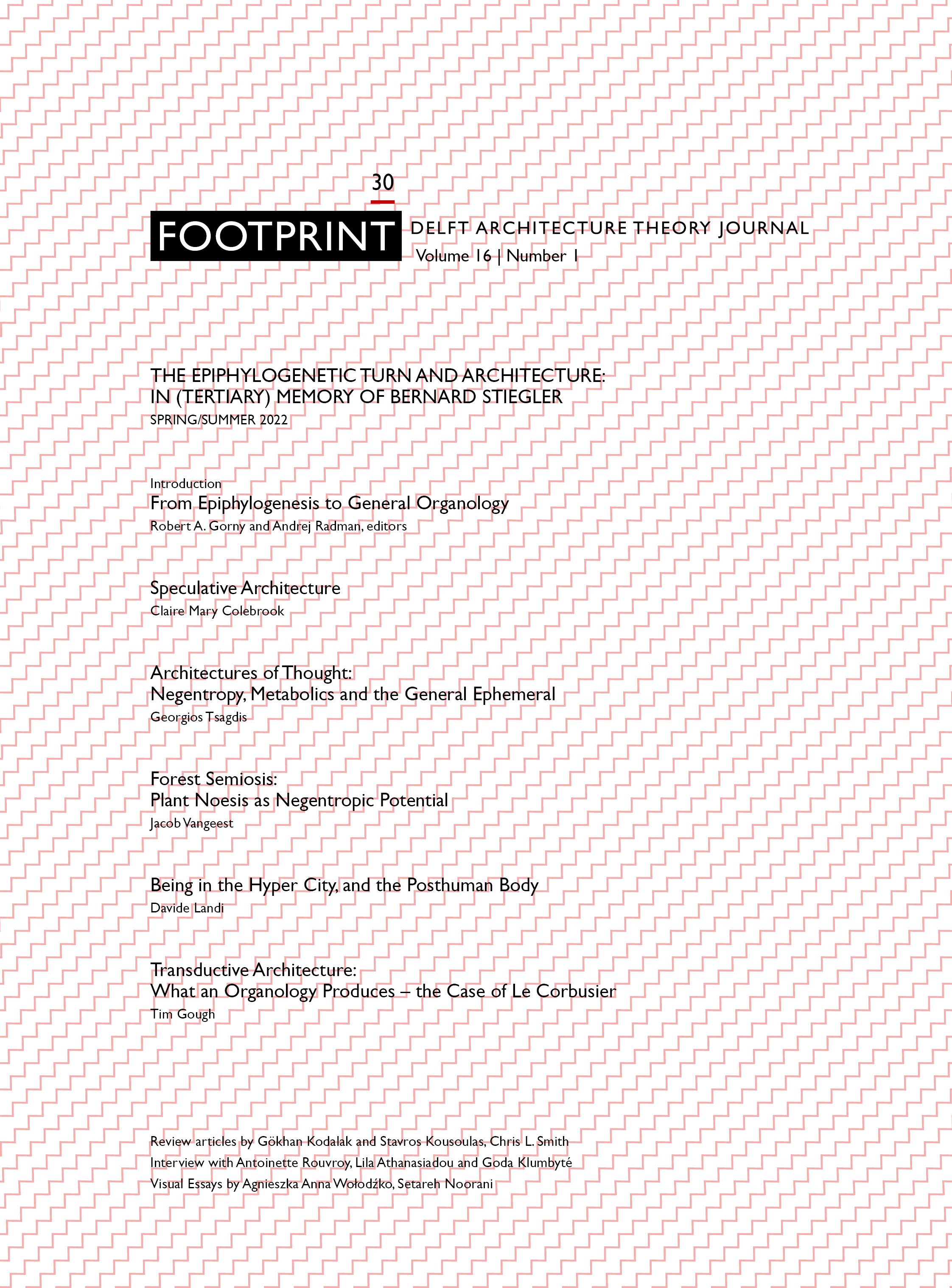Being in the Hyper City, and the Posthuman Body
DOI:
https://doi.org/10.7480/footprint.16.1.5660Abstract
Since ancient times, the analogy of the body in relation to buildings was central both in Western and Eastern architectural and urban design. Over time, the prevalence of economies over inhabitants’ experience led to the adoption of architectural and urban strategies to improve spatial efficiency and specialisation. The analogy of body-buildings was affected negatively. Nonetheless, the 21st-century technological revolution transformed the city and its inhabitants into something different. These are quantified cities which are experienced dynamically by quantified post-human beings. Consequently, a renewed paradigm body - built environment is established. Taking this position into consideration, this article critically investigates the paradigm Hyper City – Post-Human body. In this, the article introduces an alternative psychological interpretation of the analogy body - buildings. It is built around an acknowledgement of a necessary continuity between digital and physical domains to effectively question the notion of urbanisation.
References
AA. ‘Mario Carpo, Form-Making to Form-Finding’. 2015. AA School of Architecture, September 30, 2015. Video, 74:18. https://www.youtube.com/watch?v=CBtp-meUJhw.
Abbinnett, R. The Thought of Bernard Stiegler: Capitalism, Technology and the Politics of Spirit. New York City, NY: Routledge, 2018.
Benedikt, Michael, ed. Cyberspace. First Steps. Cambridge, MA: MIT Press, 1991.
Berry, David M. ‘Infrasomatization’, Stunlaw, December 15, 2016. http://stunlaw.blogspot.com/2016/12/infrasomatization.html.
Biondani, Cristian. ‘Roberto Bolle: Danza con Me’. 2019. Radio Televisione Italiana (RAI), January 1, 2019. Video, 135:55. https://www.raiplay.it/video/2018/12/Roberto-Bolle-Danza-con-me-61d913db-b2bf-4a4b-8e51-7f09763fb9aa.html.
Bratton, Benjamin H. The Stack. Cambridge, MA: The MIT Press, 2015.
Burdett Ricky, and Deyan Sudjic, eds. The Endless City. London, UK: Phaidon, 2008.
Castells, Manuel. The Rise of the Network Society. Oxford, UK: Wiley-Blackwell, 2000.
Castells, Manuel. ‘Changing the World in the Network Society’. In Networks of Outrage and Hope, Manuel Castells, 246-271. Cambridge, UK: Polity Press, 2012.
Claudel, Matthew, and Carlo Ratti. The City of Tomorrow: Sensors, Networks, Hackers, and the Future of Urban Life (The Future Series). New Haven, MA: Yale University Press, 2016.
Colomina, Beatriz, and Mark Wigley. Are We Human? Notes on Archaeology of Design. Zurich, CH: Lars Muller Publisher, 2016.
Derrida, Jacques. ‘POINT DE FOLIE — MAINTENANT L'ARCHITECTURE. Bernard Tschumi: La Case Vide — La Villette, 1985’. AA Files, no. 12 (1986): 65-75. http://www.jstor.org/stable/29543519.
Derrida, Jacques. Of Grammatology. Baltimore, MD: Johns Hopkins University Press, 1998.
Dwyre, Cathryn, and Chris Perry. ‘Expanded Fields: Architecture/Landscape/Performance’. PAJ: A Journal of Performance and Art 37, 1 (2014): 1-8. https://doi.org/10.1162/PAJJ_a_00230.
Easterling, Keller. Extrastatecraft: The Power of Infrastructure Space. London, UK: Verso, 2014.
Georgescu-Roegen, Nicholas. ‘Inequality, Limits and Growth from a Bioeconomic Viewpoint’, Review of Social Economy, 35:3 (1977): 361-375. 10.1080/00346767700000041.
Grosz, Elizabeth. ‘Bodies-Cities’. In Sexuality and Space: Princeton Papers on Architecture, edited by Beatriz Colomina, 241-253. Princeton, NJ: Princeton Architectural Press, 1992.
Grosz, Elizabeth. Architecture from the Outside: Essays on the Virtual and Real Space. Cambridge, MA: MIT Press, 2001.
Harari, Yuval Noah. Homos Deus. A Brief History of Tomorrow. London, UK: Harvill Secker, 2015.
Haraway, Donna J. ‘A Cyborg Manifesto: Science, Technology, and Socialist-Feminism in the Late Twentieth Century’. In Simians, Cyborgs, and Women: The Reinvention of Nature edited by Donna J. Haraway, 149-181 . New York City, NY: Routledge, 1991.
Hayles, Katherine N. How We Became Post-Human: Virtual Bodies in Cybernetics, Literature, and Informatics. Chicago, IL: University of Chicago Press, 1999.
Heidegger, Martin. ‘The Question Concerning Technology’. In The Question Concerning Technology and Other Essays, edited by Lovitt, William, 3-35. London, UK: Garland Publishing, Inc., 1977.
Heidegger, Martin. ‘Building, Dwelling, Thinking’. In Basic Writings, edited by Krell, David, 343-364. London, UK: Routledge, 1993.
Herzog, Werner, dir. Lo and Behold, Reveries of the Connected World. 2016. USA: NetScout, 98 min.
Illies, Christian, and Nicholas Ray. Philosophy of Architecture. Cambridge, UK: Cambridge Architectural Press, 2014.
Krier, Leon. ‘Critque of Zoning’. In Leon Krier, Houses, Palaces and Cities, edited by Porphyrios, Demetri, 32-35. London, UK: Architetural Desing AD Editions Ltd, 1984.
Kostof, Spiro. The City Assembled. London, UK: Thames and Hudson, 1992.
Landi, Davide. ‘The Image of the Hyper City’. International Journal for the Semiotics of Law, Special Issue 32: Cities as Ill Bodies (2018): 533 - 548. https://doi.org/10.1007/s11196-018-9583-8
Le Corbusier. Modulor. London, UK: Faber and Faber ltd, 1958.
Leroi-Gourhan, André. Gesture and Speech. Cambridge, MA: MIT Press, 1993.
Lotka, Alfred J. Elements Of Physical Biology. Baltimore, MD: Williams & Wilkins Company, 1925.
Markus, Thomas A. Building and Power. London, UK: Routledge, 1993.
Massumi, Brian. ‘Sensing the Virtual, Building the Insensible’. In Hypersurface Architecture, edited by Perrella, Stephen, 16-24. London, UK: Architectural Design, 1998.
Massumi, Brian. Parables for the Virtual. Movement, Affect, Sensation. Durham, UK: Duke University Press, 2002.
Matsuda, Keiichi. ‘Kickstarter - Hyper-Reality: A New Vision of the Future’. 2013. Critical Design, December 15, 2013. Video, 2:50. https://vimeo.com/78557705.
Matsuda, Keiichi. ‘Hyper-Reality’. 2016. Critical Design, May 16, 2016. Video, 6:15. https://vimeo.com/166807261.
Matsuda, Keiichi. ‘Merger’. 2018. Critical Design, November 21, 2018. Video, 4:02. https://vimeo.com/302028562.
Mitchell, William J. City of Bits. Cambridge, MA: MIT Press, 1996.
Mitchell, William J. E-topia. Urban Life, Jim — But not as We Know It. Cambridge, MA: MIT Press, 1999.
Mitchell, William J. Me++. The Cyborg Self and the Networked City. Boston, MA: MIT Press, 2004.
Morton, T. Hyperobjects. Philosophy and Ecology after the End of the World. Minneapolis, MN: University of Minnesota Press, 2013.
Mostafavi, Mohsen. The Ethics of the Urban: the City and the Space of the Political Zurich, CH: Lars Muller Publishers, 2017.
Negroponte, Nicholas. ‘Towards a Theory of Architecture Machines’. Journal of Architectural Education 23, 2 (1969): 9-12. 10.2307/1423828.
Negroponte, Nicholas. Being Digital. New York, NY: Vintage Books, 1996.
O’Connell, Mark. To Be a Machine. Adventures Among Cyborgs, Utopians, Hackers, and the Futurists Solving the Modest Problem of Death. New York, NY: Anchor Book, 2017.
Onians, John. ‘Greek Temples and Greek Brain’. In Body and Building. Essays on the Changing Relation of Body and Architecture, edited by George Dodds, and Robert Tavernor. Cambridge, MA: MIT Press, 2002.
Pepper, Simon. ‘Body, Diagram, and Geometry in the Reinessence Fortress’. In Body and Building. Essays on the Changing Relation of Body and Architecture, edited by George Dodds, and Robert Tavernor. Cambridge, MA: MIT Press.
Picon, Antoine. French Architects and Engineers. Cambridge, UK: University Cambridge Press, 2002.
Picon, Antoine. Digital Culture in Architecture. An Introduction for the Design Profession. Basel, CH: Birkhauser GmbH, 2010.
Popper, Karl R. Objective Knowledge: An Evolutionary Approach. Oxford, UK: Oxford University Press, London, 1974.
Rowe, Colin. The Mathematics Of The Ideal Villa And Other Essays. Cambridge, MA: MIT Press, 1977.
Sennett, Richard. Flesh and Stone. The Body and the City in Western Civilization. New York, NY: Norton Paperback, 1994.
Simondon, Gilbert. On the Mode of Existence of Technical Objects. Minneapolis, MN: University of Minnesota Press, 2016.
Stiegler, Bernard. Technics and Time, 1: The Fault of Epimetheus. Redwood City, CA: Stanford University Press, 1998.
Stiegler, Bernard. Technics and Time, 2: Disorientation. Redwood City, CA: Stanford University Press, 2008.
Stiegler, Bernard. Technics and Time, 3: Cinematic Time and the Question of Malaise. Redwood City, CA: Stanford University Press, 2010.
Stiegler, Bernard. For a New Critique of Political Economy. Oxford, UK: Wiley-Blackwell, 2010.
Stiegler, Bernard. Uncontrollable Societies of Disaffected Individuals: Disbelief and Discredit, Volume 2. Oxford, UK: Wiley-Blackwell, 2012.
Stiegler, Bernard. What Makes Life Worth Living: On Pharmacology. Cambridge, UK: Polity Press, 2013.
Stiegler, Bernard. Symbolic Misery- Volume 1: The Hyperindustrial Epoch. Oxford, UK: Wiley-Blackwell, 2014.
Stiegler, Bernard. The Lost Spirit of Capitalism: Disbelief and Discredit, Volume 3. Oxford, UK: Wiley-Blackwell, 2014.
Stiegler, Bernard. ‘Power, Powerlessness, Thinking, and Future’, Los Angeles Review of Books (2015). https://lareviewofbooks.org/article/power-powerlessness-thinking-and-future/#!.
Stiegler, Bernard. States of Shock: Stupidity and Knowledge in the 21st Century. Cambridge, UK: Polity Press, 2015.
Stiegler, Bernard. The Neganthropocene. Atlantic Highlands, NJ: Open Humanities Press, 2018.
Tafuri, Manfredo. Architecture and Utopia: Design and Capitalist Development. Cambridge, MA: MIT Press, 1976.
TU Eindhoven. ‘Stephen Graham, Smart Cities: A Sceptic's View’. Lecture at the 15th Architectural Humanities Research Association (AHRA) International Conference. Eindhoven, NL, 15th – 17th November 2018.
Ungers, Oswald M. Oswald Mathias Ungers: Morphologie City Metaphors. Berlin, GE: Walther König, 2011.
UNSW. ‘Mario Carpo, The Second Digital Turn in Architecture’. 2015. UNSW Built Environment, September 14, 2015. Video, 35:58. https://www.youtube.com/watch?v=HfpcFnqfnKY.
Vidler, Anthony. ‘The Building in Pain: The Body and Architecture in Post-Modern Culture’. AA Files, no. 19 (1990): 3-10. http://www.jstor.org/stable/29543679.
Vitruvius. The Ten Books on Architecture. Cambridge, MA: Harvard University Press, 1914.Watkin, David. A History of Western Architecture. London, UK: Laurence King Publishing, 2005.
Wittkower, Rudolf. Architectural Principles in the Age Of Humanism. Chichester, UK: Academy Editions, 1998.
Downloads
Published
Issue
Section
License
Copyright (c) 2022 Davide Landi

This work is licensed under a Creative Commons Attribution 4.0 International License.
- Authors retain copyright and grant the journal right of first publication with the work simultaneously licensed under a Creative Commons Attribution License that allows others to share the work with an acknowledgement of the work's authorship and initial publication in this journal.
- Authors are able to enter into separate, additional contractual arrangements for the non-exclusive distribution of the journal's published version of the work (e.g., post it to an institutional repository or publish it in a book), with an acknowledgement of its initial publication in this journal.





